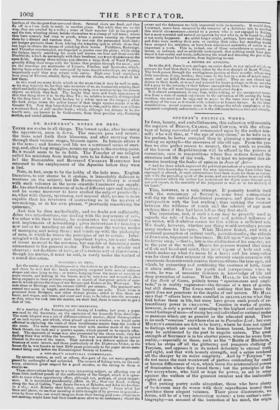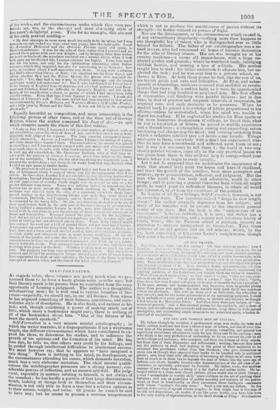SOUTHEY'S POETICAL WORKS.
IN form, beauty, and embellishments, this collection will resemble the reprints of BYRON, CRABBE, and COWPER, with the advan- taize of being corrected and commented upon by the author him- self; who will thus, at " the age of sixty-three," as he tells us in his preface, be better occupied than in planning a monument or writing an epitaph—the resources of idle old age. From the pre- face we also gather reason to suspect, that as much as possible of the leaven of Republicanism will be effaced in the process of correction, save in compositions where free notions formed the structure and life of the work. So at least we interpret this ad- mission touching the faults of opinion in Joan of Arc- " And for those which expresRed the political prejudices of a young man who had too little knowledge to suspect his own ignorance, they have either been expunged or altered, or such substitutions have been made for them as harmo- nize with the pervading spirit of the poem, and are nevertheless in accord with those opinions which the author has maintained for thirty years through pod and evil report, iu the maturity of his judgment as well as iu the sincerity of his heart."
This, however, is a vain attempt. If posterity trouble itself with the consistency of Scourlissr, some busy commentator will dig up the earlier Jacobinical passages, and place them in juxtaposition with the last reading ; thus making the contrast between the wildness of youth awl the sobriety of age more striking than if they had been left as they first stood.
The reputation, and, if such a term may be properly used as regards the sale of bouks, the moral and political influence of the writer, will doubtless secure for this eslition a sufficient sale. We doubt, however, whether any thing would nowadays procure many readers for his epics. What MisToN feared, and with a profound perception of critical truth, notwithstanding the ridicule of JOHNSON, happened to SOUTHEY. He MI upon "an age too late for heroic song,--that is, late in the civilization of his country, not in the year of the world. Hence his persons wanted that union of flysh and blood and spirit, that joust vigour of body and soul, which makes up what we mean by a hero ; and his composition was far short of that mixture of the severely simple narrative with passionate dramatic condensation that constitutes the true epic, and which, by extracting and combining the essences of both, raises it above either. From his youth and inexperience when he wrote, lie was of necessity deficient in knowledge of life and deep perception of nature. What Mr. HALL, in his late volume of the Book of Gems, politely terms " spaciousness and ampli• tude," is in reality vagueness—the dreams of a man of genius, but still dreams. The forms recall nothing that has been; the spirit does not penetrate to the depths of our nature. Mr. HALL says that " others have more excelled in DELINEATING what they find before them in life, but none have given such proofs of ex- traordinary power in CREATING." Creation in works of genius, however, is only a power of appealing to the highest and most uni- versal feelings of man—of rising beyond individual or national modes to passions which are as general as the educated mind. There is no such "creation" anywhere else as in Paradise Lost; but even MILTON'S creations are felt to be heavy, where lie does not appeal to feelings which are rooted in the human breast, however they may be sublimated by the poet to angelic nature. The great strength of SOUTBEY is in his shorter pieces, where he wrote from reality,—especially in those, such as the " Battle of Blenheim,
when he strips off all the glittering and pompous clothing of Toryism, and opposes it in its naked deformity to eternal truth and right, and that with homely strength, and a satire rendered
all the sharper by its naive simplicity. And by " Toryism " we do not mean the cant watchword of parties contending for small
or barren differences of view, which leave the aristocratical powers of domination where they found them ; but the principles of the Few everywhere, who hold or hope for power, as set in array against the welfare of' the greatest number and the inalienable rights of man.
But putting poetry aside altogether, those who have plenty of book-room may do worse with their superfluous money than
purchase these elegant volumes. Their prose illustrations, we divine, will be of a very interesting nature: a true author's auto- biography—an account of the formation of his mind, the origin
of his works, and the circumstances under which they were pro- deiced; set, too, in the chastest and most eta-ming style of SOUTHEY'S delightful prose. Take for an example, this account of his early poetical reading- 3ly first attempts in verse were much too early. to be imitative, but I was fortunate enough to haul my way, when very young, into the right path. I read the Jerusalem Delivered and the Orlando Furioso again and again, in Hook's translations: it was for the sake of their stories that I perused and re- perused these poems with ever new delight ; and by bringing them thus within Inv reach in boyhood, tke translator rendered me a service which, when I look hick upon my intellectual life, I cannot estimate too highly. I owe him much also for his notes, not only for the information concerning other Italian romances which they imparted, but also for introducing me to Spenser ; how early, an incident which I well remember may show. Going with a relation into Bull's circulating library at Bath, (an excellent one for those days,) and asking whether they had the Fury Queen, the person who managed the shop sail, Yes, they had it, but it was in obsolete language, and the young gentleman would not understand it.' But I. who had learned al; I then knew of the history of England from Shakepeare, aid who had moreover read Beau- moot and Fletcher, found no difficulty in Spenser's English, and felt in the beauty of his versification a charm in poetry of which I bad never been fully sensible before. From that time I took Spenser for my master. I drank also betimes of Chaucer's well. The taste which bad been acquired in that school was confirmed by Percy's Reliques and Warton's Ilistory Edylish Poetry ;
and a little later by Homer and the Bible. It was nut likely to be corrupted afterwards."
Equally beautiful as composition, and more interesting, is the following picture of other times, and of the then out-of the-way Brixton, where the author composed his Joan of Are,—an epic which cccupies nearly the whole of this first volume.
Eelly in July 179a, I happened to fall in conversation, at (Weill, with an old schoolfellow, upon the story of Joan of Arc, and it then struck me as being
singularly well adapted for a poem. The long vacation commenced 'mine- diitely afterwards. As soon as I reached home, I formed the outline of a plan, and wrote about three hundred lines. The remainder of the month was passed in travelling ; and I was too much engaged with new scenes and circumstances to proceed, even in thought, with what had been broken off. hr Augli,t I went to visit my old schoolfellow, Mr. Grosvenor Bedford, who at diet time re- side,' with his parents at lkixton Ceuseway, about tour miles on the Surry side of the metropolis. There, the day utter completing my nineteenth year, I resumed the undertaking.; and there, in six weeks from that day, finished what I called an epic poem in twelve books. " My progress would not have been so rapid had it not been for the opportu • nits of retirement which I enjoyed there, and the encouragement that I re- ceived. In those days, London had not extended in that direction further than Kennington ; beyond which place the scene changed suddenly, and there seas an air and appearnice of country which might now be simeht in vain at a far greater distance from town. There was nothing indeed to remind one that London was so near, except the slued* which overhung it. Mr. Bedford's residence was situated upon thud edge of a common, on wrieh shady lanes opened leading to the neighbouring villages (for such they were then) of Camberwell, Dulwich, and Clapham, and to Norwood. The view in front
was bounded by the Sorry hills. Its size and structure showed it to he one of those good houses built in the early part of the last century, by persons who, having realized a respectable fortune in trade, were wise enough to be cou• tented with it, and retire to pass the evening of their lives in the enjoyment of
leisure and tranquillity. Tranquil indeed the plate for the ne:ghbour- hood did not extend beyond hall-aelezen famihee ; and the Loudon style and habits of visiting had not obtained among, them. Unele Toby himeell night have enjoyed his rood and a hall of ground there, and not II tee had it known. A fore-court separated the house from the foot.path rho road in front ; be- hind. there was a large and well. stock,d garden, with other spacious premises, in which utility and ornament were in some degree combined. At the ex- tremity of the garden, and under the shade et tour lofty linden trues, was a summer-house looking on an ornamental grass-dot, awl fitted up as a conve- niently habitable room. That sununer-house was allotted to nit', and tl:ere my
mornings were passed at the desk. Whether it exists now or not, I an i:mo-



























 Previous page
Previous page